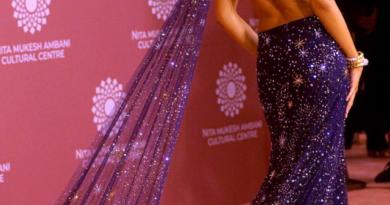<i>Never Have I Ever</i> Allowed Indian Widows to Move On
The third installment of Deepa Mehta’s elemental film trilogy, 2005’s Water, opens with a verse from the Laws of Manu of the Dharmashastras, a sacred Hindu text. “A widow should be long suffering until death, self-restrained and chaste. A virtuous wife who remains chaste when her husband has died goes to heaven. A woman who is unfaithful to her husband is reborn in the womb of a jackal,” the text reads on screen.
What follows is a harrowing tale of a young girl, first forced into child marriage and now left widowed before she even hits double digits, relegated to spend the rest of her days in an ashram to atone for her supposed sins from a previous life that caused her husband’s death in this one. This, coupled with the practice of sati, in which the widow is expected to throw herself on her husband’s funeral pyre to perish alongside him, are ancient Hindu beliefs that boil down to one thing: A woman’s life is meaningless without a husband.
Water tells an extreme story about an 8-year-old dealing with this plight, but it’s not uncommon to expect Indian widows to never remarry, even today—after all, it’s a culture that has, for so long, emphasized arranged marriages over those of love and passion, and expected expensive dowries from brides’ families in addition to her hand in marriage. In many parts of ancestral India, having a daughter was viewed as more of a burden than a gift. While India is evolving rapidly, much of the country is still patriarchal to this day and both men and women often perpetuate these ideas as the fabric of the culture.
Never Have I Ever, Netflix’s Indian American coming-of-age comedy created by Mindy Kaling and Lang Fisher, upends this traditional belief over the course of four seasons, modernizing this aspect of Indian culture for its diaspora and the 21st century. Widowhood is central to the series, which focuses on the Vishwakumar family’s life after the shocking death of its patriarch Mohan (Sendhil Ramamurthy). His sudden passing at his daughter Devi’s (Maitreyi Ramakrishnan) orchestra concert propels the show’s plot, as Devi finds herself engulfed by her grief and failing to bridge the gap between her and her stern mother Nalini (Poorna Jagannathan). Seeking help in raising her daughter, Nalini asks her widowed mother-in-law Nirmala (Ranjita Chakravarty) to come live with them and provide stability in their lives.
Devi may be the show’s focus, but both Nalini and Nirmala are afforded stories that see them as more than widows. They both end the series in new relationships while still honoring their late husbands—a far cry from the fate of Water’s protagonists and the many real women who were dealt those cards.
In Kaling and Fisher’s hands, Nalini isn’t doomed to a life of celibacy and an all-white wardrobe; she’s allowed to dip her toes back into the dating waters multiple times throughout the series’ run. Nalini hasn’t ruled out the idea of finding love again, but it’s not always easy for her to put her needs first. In season 2, she cautiously reenters the dating scene with fellow dermatologist Dr. Jackson (played by Common), much to Devi’s chagrin. She can’t fathom the idea that her mom has moved on so quickly and is ready to put Mohan’s memory behind them when Devi is still experiencing her grief so fully.
“We throw dad’s ashes in the ocean and then boom, you turn around and date another man?” Devi accuses her mom after she’s caught trespassing at Dr. Jackson’s house. But it’s an unlikely source who defends Nalini instead of upholding the cultural and societal expectations of being a widow: her mother-in-law, Nirmala. “Your mother is an adult and the reason you have everything in your life,” Nirmala scolds Devi. “She can do what she wants without your judgment.” It’s a refreshing interaction that doesn’t pit the two matriarchs against one another and doesn’t perpetuate any harmful expectations of what grief and recovery look like, especially in the confines of Indian culture.
Never Have I Ever is primarily a story of Devi’s growth, and two seasons later in season 4 she not only sheds her incredulity at her mom moving on, but she actually encourages it. When she suspects that Nalini has a crush on their contractor Andres—who also happens to be the dad of her arch nemesis Margot—she concocts a plan to first win over Margot and then invite them to a dinner at the Vishwakumar home. The dinner is disastrous but the chemistry between Nalini and Andres is palpable, so much so that he comes back later to kiss her.
Throughout all of Nalini’s dating adventures, she’s maintained varying ties to the wearable symbols of her marriage. Before going on a date with Dr. Jackson in season 2, she removes her wedding ring but immediately feels odd about it; while dating Andres, she still wears her marital thali—a long gold necklace that Tamil Hindu brides wear after marriage—even when Devi suggests she remove it. “Andres doesn’t really care that I wear it and honestly I’m just so used to it,” she reasons to her skeptical family. The chain remains around her neck until the very end of the series finale when she takes it off and places it in a keepsake jewelry box, a respectful farewell to one chapter and a nod to her new one.
Perhaps the most surprising development of the show’s final season is that this grace also extends to Devi’s grandmother Nirmala. Often a source of comic relief, Nirmala surprises the family early in season 4 by announcing she’s dating her white boyfriend Len. Devi’s cousin Kamala (Richa Moorjani) is the first to find out and though she later becomes skeptical of Len’s intentions, her initial reaction is one of happiness, even though her grandma feels uneasy about dating again 20 years after her husband’s death. “Respectable widows aren’t supposed to move on,” Nirmala tells Kamala, wracked with guilt. “My mother was a widow from age 22 to 104. That’s the way you’re supposed to do it.” Instead of passing judgment, Kamala offers acceptance. “Wanting companionship is not shameful,” she tells her grandmother lovingly. “All we want is for you to be happy.”
Kamala isn’t the only one to give Nirmala the green light: When the news about Len breaks to the whole family, Nalini is surprised but immediately accepting. “Congratulations, mami,” she tells her mother-in-law, reciprocating the kindness that she was shown two years prior. Never Have I Ever’s final episode ends with a colorful Indian-Jewish wedding that prioritizes and celebrates Nirmala’s happiness instead of encouraging a “self-restrained and chaste” life.
Never Have I Ever will have many legacies: Its portrayal of Indian-American identity and culture—whether characters were chafing against it or fully embracing it—felt truthful and approachable; the way it handled grief and its many manifestations was empathetic; and its portrayal of a smart, nerdy girl dating the hottest guys in school felt revolutionary. But I also hope it’s remembered for the sensitivity and understanding it afforded its older generation of women, and for its part in showing how some traditional Indian customs are evolving for a new generation.
Radhika Menon is a freelance entertainment writer, with a focus on TV and film. Her writing can be found on Vulture, Teen Vogue, Bustle, and more.









